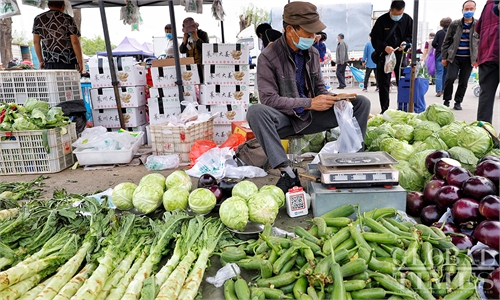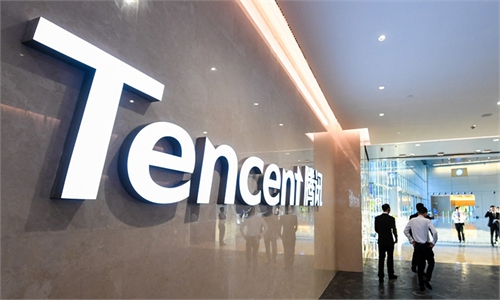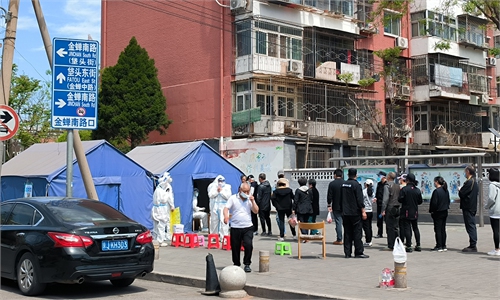Beijing fights new surge with ensured supplies
Capital launches mass nucleic acid testing for nearly 90 percent of population
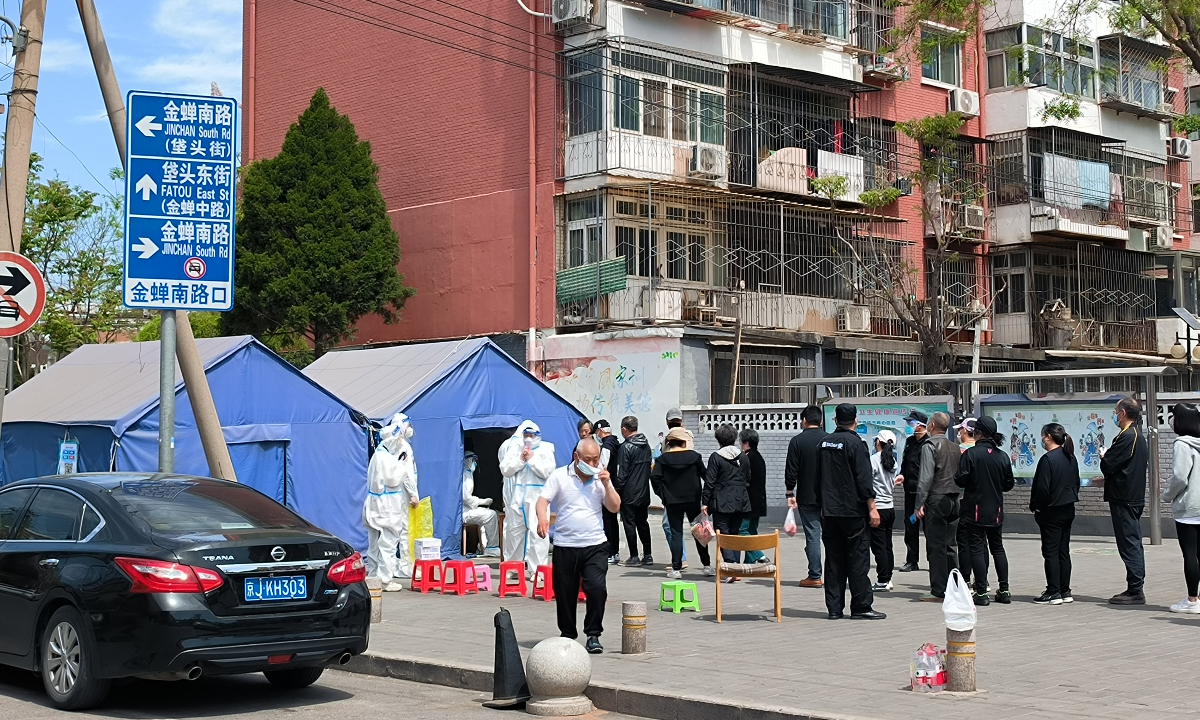
Beijing reports four newly confirmed COVID-19 cases and 10 silent coronavirus carriers on Friday. Photo:VCG
Expanding temporarily controlled areas by requiring residents to stay indoors as much as possible, organizing large-scale nucleic acid tests and ensuring supplies of basic goods... Beijing swiftly moved to curb transmissions in the current COVID-19 flare-up.
Analysts expressed confidence in the city's quicker and stronger measures to implement a "four early" practice - early finding, early reporting, early confirming and early quarantine, which is the essence of the dynamic zero-case policy but also warned of the risk of more infections with the wider mobility of people during the upcoming May Day holidays.
Beijing reported 29 confirmed COVID-19 cases on Monday, raising the total number of infections to 70 since April 22, and 46 were found in Chaoyang district. Aside from cluster infections in a middle school in Chaoyang, some cases were found at dinner parties. The transmission routes of this round of flare-ups had been identified, according to the press conference on Beijing's epidemic held on Monday morning.
Chaoyang district started the first round of mass nucleic acid tests to 3.5 million of its residents on Monday. And two more rounds are scheduled on Wednesday and Friday. The district has tested 3,691,200 residents and as of 8 pm, 526,120 results are all negative.
Beijing health authorities announced on Monday evening's press conference that the Chinese capital will launch nucleic acid testing in 11 more areas across the city from Tuesday.
Compared to Shanghai, Beijing has taken large-scale nucleic acid tests at an early stage to find confirmed and asymptomatic cases, which will greatly help put the epidemic under control, Lu Hongzhou, head of Shenzhen's anti-epidemic expert team and head of the Third People's Hospital of Shenzhen, told the Global Times Monday.
Lu noted that arranging nucleic acid tests with an interval of one day would also help to accurately screen out potential cases considering the incubation period. Such an arrangement is scientific and fits into epidemiological characteristics.
Wang Guangfa, a Beijing-based respiratory expert, told the Global Times on Monday the three nucleic acid tests are key for Beijing to adjusting anti-epidemic measures. It is good news to hear the chains of transmissions have been made clear as it means we have spotted confirmed cases and put close contacts under observation. The next step for Beijing is to study the results of the mass nucleic tests.
He explained that a big picture of the epidemic situation will be drawn following the results of the first round of nucleic acid tests. If more cases with clear transmission chains are detected outside currently sealed-off or restricted areas, we need to do more epidemiological investigations and decide whether to impose restrictions on wider areas.
But if transmission chains of those new cases are ambiguous, it might indicate a severe outbreak situation in Beijing, Wang said.
Health experts reached by the Global Times in recent days believe that Beijing has already taken effective and strong prevention measures and the infections may not surge like those in Shanghai.
Beijing adopted a very "precise" and "enlarged" epidemic prevention and control measures, which are different from Shanghai's moves in its initial fight against the virus, Wang said, noting that current COVID-19 data shows that Beijing has a good hold over this wave of epidemic resurgence as the Beijing government acted quickly enough to implement the "four early" practice.
Even though the virus is believed to have been quietly spreading among communities for a week, which means an intergenerational spreading, as residents in Beijing have to wear facial masks and it is hard to predict how many potential cases have been spread. But what is for sure is that the travels of residents for the upcoming May Day holidays will be limited by the flare-up, said Wang.
Experts stressed that risks remain and the pressure to fight COVID-19 has further escalated due to the multiple risks brought about by people coming from outside the capital city and the increasing flow as May Day approaches, and they advised the local government to act as fast as possible to cut off transmission chains.
Aside from taking sweeping tests, on Monday, by naming some affected streets, Chaoyang district zoned temporarily controlled areas with upgraded prevention measures, including requiring residents not to come out of the sealed-off areas, getting registered when coming in and going out of residential areas, implementing working from home and suspending nursing houses, entertainment and public venues like cinemas.
Despite the stricter measures adopted in certain areas, the prevention remains accurately targeted and considerable. A resident surnamed Xu, who lives in the Runyuan residential community in Chaoyang where a confirmed case was found on Sunday, shared his experience.
"I received a phone call from the residential community on Sunday afternoon to inform me about the confirmed case and the close-off management of the community. They asked whether my family has pregnant women or people who need special care or if we have other living requirements," Xu said.
"We were told to have nucleic acid tests around 6pm on Monday. The community studied the test results, and residents in four buildings are required not to come out, and residents in other buildings in the community have returned to normal," said Xu, praising the effective adjustments and elaborate and considerate prevention measures.
With the resurgence of COVID-19 in China, especially in Shanghai and Beijing, some Western media again questioned China's dynamic zero-COVID policy. In response, Foreign Ministry spokesperson Wang Wenbin said in a routine press conference on Monday that China's current anti-epidemic policy, based on science and experts' suggestions, effectively safeguard the health and safety of Chinese people and foreigners in China.
Every prevention measure has its cost and some measures in China have some influence on people's lives, which may happen in any country. But the Chinese people have full confidence in overcoming the epidemic. Chinese people did not "lie flat" in the face of the Delta variant, and will not lie flat with Omicron, said Wang.
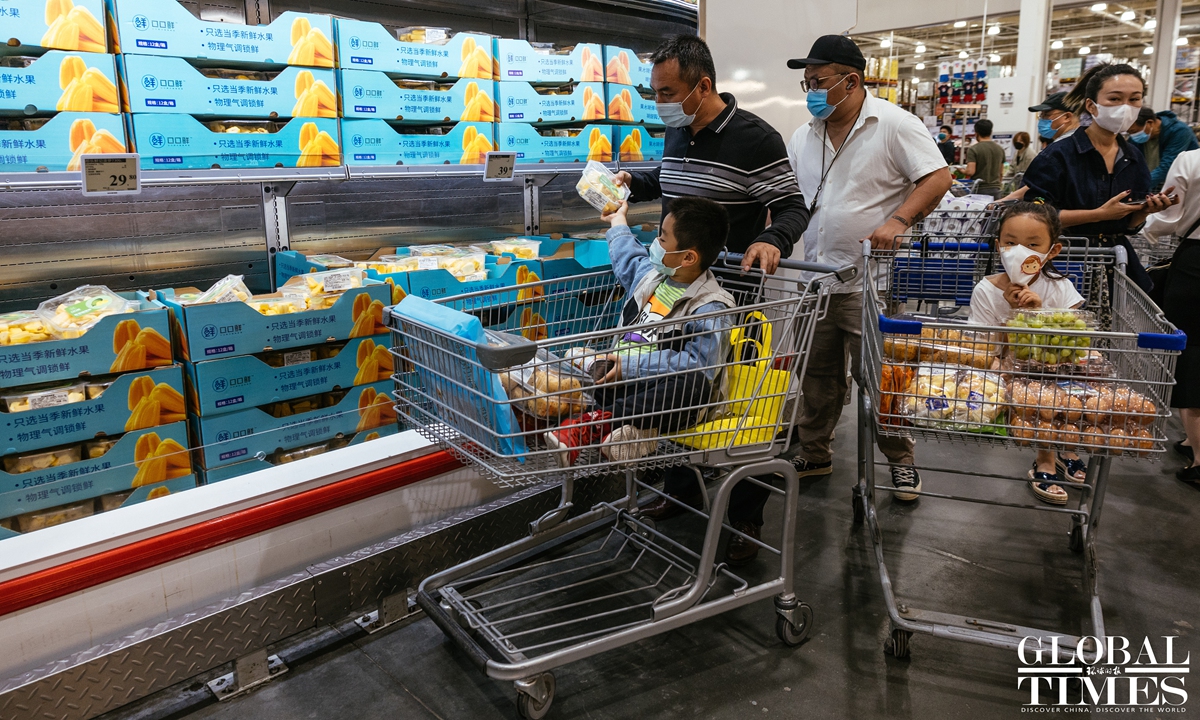
Beijing residents shop groceries in preparation for potential lockdown.Photo:Li Hao/GT
Stable, sufficient supplies
Aside from long queues for nucleic acid tests in residential communities, people waiting to enter some supermarkets were another sight to behold on Monday morning. Since Sunday night, many residents in Beijing, especially those in Chaoyang district where most of the latest infections were reported, had rushed to markets to stock up on food and other necessities in preparation for the epidemic.
However, the impulse to buy more food seemed to be quelled in the afternoon of Monday with shelves in supermarkets in Beijing being stuffed and various vegetables and food displayed on e-commerce platforms.
A number of sellers reached by the Global Times in several markets in Chaoyang district in the early morning of Monday said they have had sufficient supplies, smooth purchasing channels, and the prices will remain stable except for a few items, including pork, of which the prices have slightly gone up.
Fresh Hema, one of the top retailers in China run by e-commerce giant Alibaba, told the Global Times that all of its 40 membership stores in Beijing are well stocked and have locked in a number of direct sources in East China's Shandong Province and North China's Hebei Province to increase supplies. The overall stocking of groceries has been increased to four to five times the usual daily amount, with prices remaining stable.
Other main retailers in Beijing, such as Walmart and Sam's Club, have also increased livelihood supplies to nearly three times of their usual stocks, the Global Times learned on Monday.
The Global Times noticed that many people came to buy necessities, but not in bulk. Some buyers said that they have confidence in Beijing to be able to quickly curb the infections and they bought some food in dealing with emergencies and to appease themselves. And some noted they bought daily items after learning from the Shanghai experience.
There is no need to stock up too much food as Beijing has perfected its material reserves system since the outbreak of SARS in 2003. As Beijing has moved non-capital functions out of the city, it kept wholesale markets and centers for farm products - these are the main sources for markets in the city and can ensure its supplies, Lai Yang, head of the Beijing Research Institute of Commerce Strategy, told the Global Times.
Logistics is crucial amid the epidemic. Beijing has issued traffic permits to related companies for smooth goods and materials transportation from outside of the city. The green channels for agricultural products to Beijing have been working well, said Lai.
"We trust Beijing's ability to provide supplies of daily materials. As related departments had called on families to store some necessities, each family can also buy what they need in advance," Lai said.
